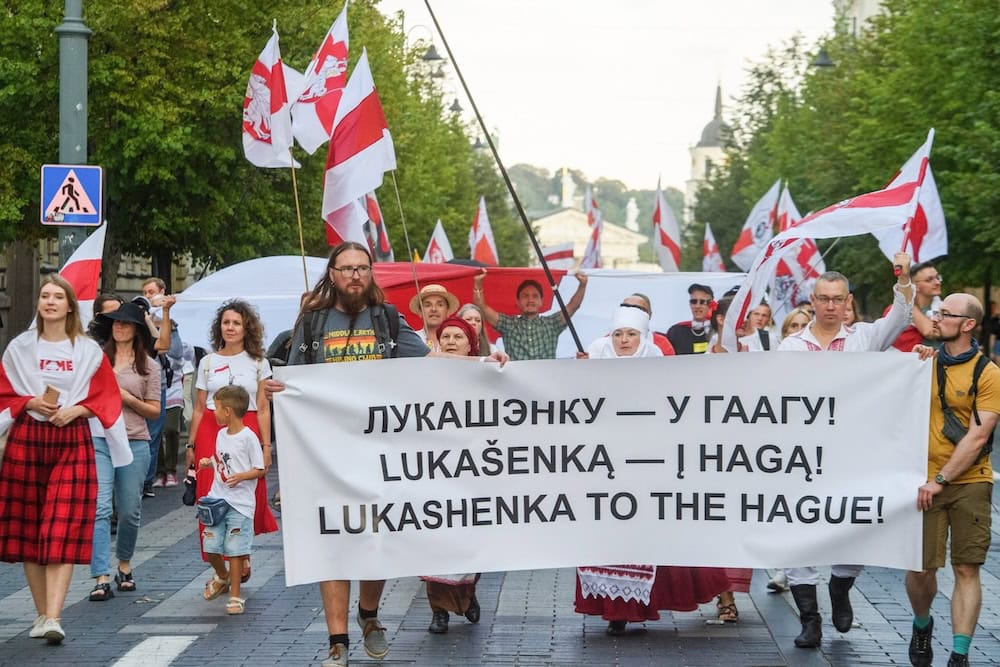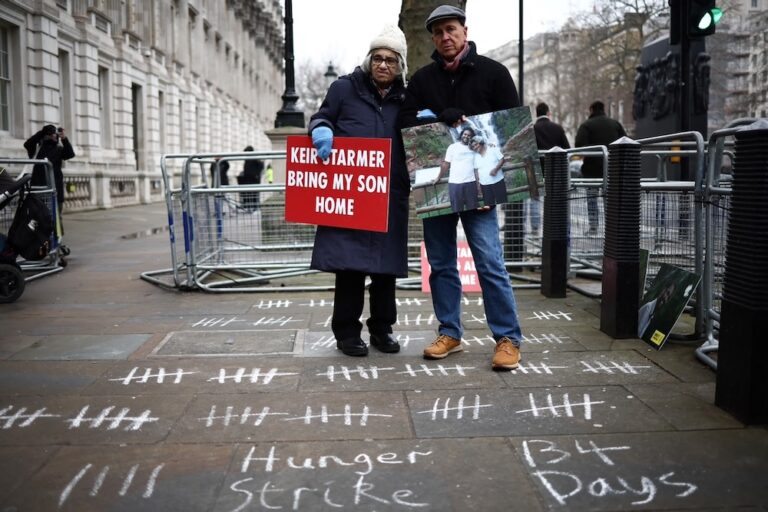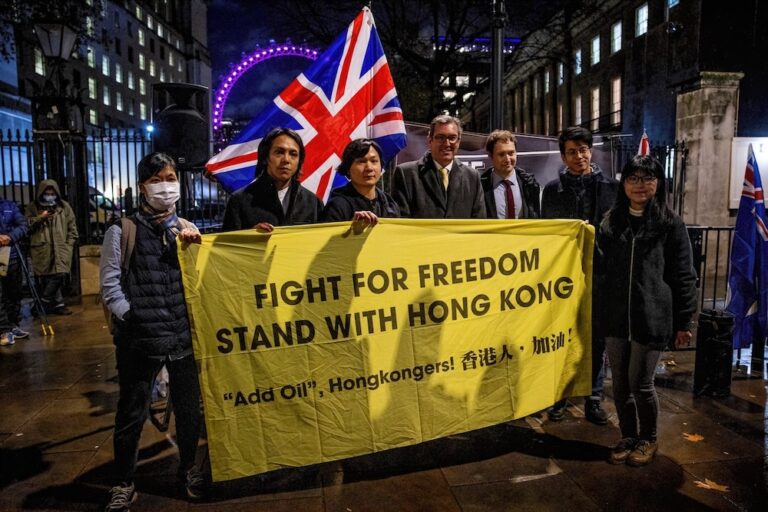August 2024 in Europe and Central Asia: A free expression round-up produced by IFEX's Regional Editor Cathal Sheerin, based on IFEX member reports and news from the region.
Journalists and activists released in Russia; marking four years of repression in Belarus; EU urged to take action on Israel; anti-LGBTQI+ propaganda law in Bulgaria; censorship in UK libraries; ten years of attacks on media in Turkey; call for accountability for attacks on government critics in Georgia.
Belarus: Four years of repression
In Belarus, 9 August marked four years since the rigged 2020 presidential election that returned Lukashenka to power, triggering mass protests and the ongoing crackdown on civic space.
IFEX members used the anniversary to put the Lukashenka regime’s persecution of independent voices in the spotlight.
ARTICLE 19 highlighted the plight of Belarus’s nearly 1,400 political prisoners and the “information vacuum” created inside the country by state propaganda. The organisation called on the international community to apply more pressure on the regime to halt its repeated violations of human rights.
The European Federation of Journalists (EFJ) called for the release of Belarus’s 37 jailed journalists, and for an end to the persecution of Belarusian journalists in exile.
PEN International also issued a statement denouncing the targeting of Belarusians in exile. Their statement highlighted the persecution of individuals and organisations in the culture sector and called on the international community to press the Belarusian authorities to release all political prisoners.
Other IFEX members marked the anniversary by providing a platform to Belarusians who have been on the receiving end of Lukashenka’s repression.
The Media Freedom Rapid Response (MFRR) mechanism published a podcast with Natalia Radzina, Editor-in-Chief of Charter’97, in which she analyses the current situation for journalism in Belarus and provides a concise history of how Lukashenka extended his control over the information space.
Freedom House published an interview with human rights defender and former political prisoner Leanid Sudalenka, in which he called for unified pressure on Lukashenka from governments and non-governmental actors on behalf of those in jail.
“Advocacy on behalf of political prisoners is crucial. My experiences have taught me that we must tirelessly remind the world of those arbitrarily detained. I am glad I am free, and I have dedicated myself to my incarcerated brothers and sisters.” – Leanid Sudalenka
Index on Censorship published an article by the exiled opposition leader Sviatlana Tsikhanouskaya in which she – “as the wife of a political prisoner” – urges members of the public to continue to write to those unjustly jailed by the Belarusian authorities.
“The last time I saw my husband Siarhei Tsikhanouski in person was in May 2020. The last time I spoke with him was in October 2020, when, for some unexplainable reason, Lukashenka personally let Siarhei call me. The last time we heard from Siarhei was 9 March 2023. My husband is being held incommunicado. For my son and daughter, sending letters, postcards and drawings to their father was keeping us morally afloat.” – Sviatlana Tsikhanouskaya
On 16 August, Lukashenka signed a decree pardoning 30 political prisoners, several of whom had serious illnesses. By 22 August, at least 19 of those pardoned had been released.
Towards the end of the month, imprisoned journalist Larysa Shchyrakova was named as one of the winners of the 2024 Free Media Awards. In 2023, she was sentenced to 3.5 years in prison on dubious charges of “promoting extremist activities” and “discrediting Belarus”.
Russia: Welcome and unwelcome prisoner releases
Political prisoners also featured prominently in news from Russia in August, which saw 16 individuals released by the Russian authorities in a prisoner swap with countries in the west.
Among those released from prison were: journalists Evan Gershkovich and Alsu Kurmasheva; opposition politicians Vladimir Kara-Murza and Ilya Yashin; co-founder of banned Russian human rights organisation Memorial, Oleg Orlov; and artist Sasha Skochilenko.
Each had been serving heavy prison sentences for either protesting Russia’s invasion of Ukraine or reporting on it. IFEX members had campaigned for their release. According to the Russian human rights group OVD-Info, over 1,000 criminal cases have been opened against individuals who have criticised the ongoing war.
Also released in August was Temirlan Eskerkhanov, one of the men convicted of murdering opposition leader and anti-corruption activist Boris Nemtsov in 2015. Eskerkhanov was granted early release in return for agreeing to fight in Ukraine, benefitting from the same prison-to-army recruitment scheme that saw Sergei Khadzhikurbanov (convicted in 2014 of murdering journalist Anna Politkavskaya) freed in 2023. In a dark irony, Nemtsov was organising a campaign against Russian military intervention in Ukraine at the time of his murder.
In August, the Committee to Protect Journalists (CPJ) published an extremely useful summary of the ways in which the Russian authorities have been trying to silence criticism of the war since February 2022, including by criminalising “fake” news about the military, expanding “foreign agent” and “undesirable” designations, and by revoking media licences and blocking websites. According to CPJ, since the start of the invasion in 2022, 268 journalists and media outlets have been branded “foreign agents”, 20 media outlets have been labelled “undesirable” (effectively banning them), and 18,500 websites have been blocked because of their content about the war.
A recent report by Reporters Without Borders (RSF) also looks closely at how “undesirable” and “foreign agents” designations have affected independent media in Russia. Of the 810 organisations listed as “foreign agents” by the Russian Ministry of Justice, over one third are media outlets – demonstrating, as RSF says, that journalism is a “prime target” of this legislation.
Human Rights Watch (HRW) also published a report on Russia in August. This one – Russia’s Legislative Minefield: Tripwires for Civil Society since 2020 – focuses on the raft of repressive laws and policies adopted by Putin’s government since 2020, and how they have been used to strangle dissent and incapacitate civil society.
In brief
IFEX joined a group of 60 free expression and press freedom organisations in calling on the EU to take action against Israel’s mass killing of Palestinian journalists. In an open letter, the groups highlight the more than 100 journalists killed in Gaza, the record number of Palestinian journalists arbitrarily detained by Israel, serious allegations of torture, and Israel’s broader crackdown on press freedom. The letter calls on EU leaders to pressure Israel to take several measures (see letter) to protect press freedom. It also calls for “the suspension of the Israel / EU Association Agreement on the basis that [Israel] has violated international human rights and criminal law and for the adoption of targeted sanctions against IDF officials and others responsible”.
Every month brings more evidence of how draconian the crackdown on pro-Palestinian voices has been in Europe over the last 11 months. This month in Germany, a Berlin court convicted German-Iranian national Ava Moayeri of condoning a crime after she chanted the slogan “from the river to the sea, Palestine will be free” at a rally a few days after Hamas’s attack on Israel on 7 October 2023. She was fined 600 euros.
In the UK, after an investigation that lasted several months, the Crown Prosecution Service finally dropped its case against international relations lecturer Dr. Amira Abdelhamid. Last year, after a series of posts on X relating to the 7 October attack on Israel, her employer, the University of Portsmouth, suspended her and referred her to the Prevent programme (part of the UK’s counterterrorism strategy). Counterterrorism officers later raided Abdelhamid’s home where they arrested her and confiscated her personal belongings, including her laptop, phone, Kindle and a protest sign with “Palestine” written in Arabic.
Members of the Media Freedom Rapid Response (MFRR) mechanism called on the authorities in Georgia to release Azerbaijani journalist Afgan Sadygov and not extradite him to Azerbaijan. Sadygov moved to Georgia seven months ago to escape persecution by the authorities in his own country, where he had been arrested several times on various dubious charges. Arrested in Tbilisi in response to an extradition request from the Azerbaijani authorities, Sadygov was sentenced to two months of pre-extradition detention on 5 August.
HRW said this month that those responsible for a spate of brutal attacks on government critics in Georgia must face accountability. Many of the targets had spoken out against the recently-adopted (and widely-protested) “foreign agents” law, and no-one has been arrested in connection with the attacks. “A pattern of harassment and intimidation of activists, independent media, and government critics,” HRW said, “if left unpunished, risks emboldening malicious actors to escalate violence in the months before Georgia’s upcoming elections”.
RSF offered an overview this month of President Erdoğan’s decade in office and its negative impact on media freedom in Turkey. According to RSF, the last ten years have seen five journalists killed, 131 imprisoned, 77 convicted of “insulting the president”, hundreds prosecuted for their work, and 85% of the national media controlled by the government.
IFEX joined other free expression groups in condemning a decision by an appeals court in Turkey to uphold the 20-month prison sentence handed to journalist Bülent Mumay in 2023. Mumay was sentenced for social media posts about an allegedly government-affiliated construction company. There were also court orders to block access to his posts. At the appeal hearing, the court ordered a block on reports about Mumay’s upheld prison sentence.
In August, President Radev of Bulgaria signed into law Russian-style anti-LGBTQI+ ‘propaganda’ legislation. The new legislation bans any kind of educational programmes on “non-traditional sexual orientation” in schools, which it labels “propaganda”. The Council of Europe and civil society groups had called on President Radev to veto the law. Over 700 Bulgarian academics warned the president that the law would “normalise” political attacks on LGBTQI+ people.
Index on Censorship recently investigated censorship in UK school libraries and found that 53% of librarians they surveyed had been asked to remove books from their shelves because of their content. Most of these requests came from individual parents and the books in question tended to contain LGBTQI+ elements (for example, an LGBTQI+ character or theme). Of the school librarians who were asked to remove books, over half complied. One librarian was told by the school’s management to remove all books with any LGBTQI+ content after one single complaint. “Even more worryingly”, writes Index’s Katie Dancey-Downs, “there seems to be a lot of self-censorship – librarians not supplying books for fear of coming into conflict with parents and senior staff in religious schools”.



